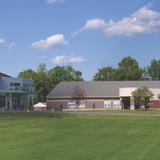- Lakes Region Community College is a public community college in Laconia, New Hampshire. It is part of the Community College System of New Hampshire.
School Highlights
Lakes Region Community College serves 1,700 students (16% of students are full-time).
The college's student-teacher ratio of 19:1 is same as the state community college average of 19:1.
Minority enrollment is 30% of the student body (majority Hispanic and Black), which is less than the state average of 33%.
Quick Facts (2026)
- Enrollment: 1,700 students
- In-state tuition: $6,642
- Out-state tuition: $14,802
- Acceptance Rate: 82%
- Student-teacher ratio: 19:1
- Minority enrollment: 30%
- Source: Integrated Postsecondary Education Data System (IPEDS)
Top Rankings
Lakes Region Community College ranks among the top 20% of public schools in New Hampshire for:
Category
Attribute
Affordability
School Overview
The teacher population of 90 teachers has stayed relatively flat over five years.
Lakes Region Community College
(NH) Community College Avg.
Carnegie Classification
Associate's Colleges: High Career & Technical-High Nontraditional
Associate's Colleges: Mixed Transfer/Career & Technical-High Nontraditional
Institution Level
At least 2 but less than 4 years
At least 2 but less than 4 years
Institution Control
Public
Public
Total Faculty
90 staff
145 staff
School Calendar
Student Body
The student population of Lakes Region Community College has grown by 143% over five years.
The student-teacher ratio of 19:1 has increased from 14:1 over five years.
The Lakes Region Community College diversity score of 0.47 is less than the state average of 0.52. The school's diversity has grown by 60% over five years.
Total Enrollment
1,700 students
1,935 students
Student-Teacher Ratio
19:1
19:1
# Full-Time Students
276 students
276 students
# Part-Time Students
1,424 students
1,659 students
# Enrollment Undergraduate
170 students
298 students
# Full-Time Undergraduate Students
276 students
276 students
# Part-Time Undergraduate Students
1,424 students
1,659 students
Total Dormitory Capacity
112 students
112 students
% American Indian/Alaskan
2%
2%
% Asian
2%
4%
% Hispanic
3%
6%
% Black
2%
3%
% White
70%
67%
% Hawaiian
n/a
n/a
% Two or more races
1%
2%
% Unknown races
20%
16%
Diversity Score
0.47
0.52
College Completion Rate (Students who graduate in less than 4 years)
34%
35%
Average Graduate Earnings (10 Years) (Year 2008)
$39,200
$40,500
Tuition and Acceptance Rate
The public in-state tuition of $6,642 is less than the state average of $6,952. The in-state tuition has stayed relatively flat over four years.
The public out-state tuition of $14,802 is less than the state average of $15,095. The out-state tuition has stayed relatively flat over four years.
In-State Tuition Fees
$6,642
$6,952
Out-State Tuition Fees
$14,802
$15,095
% Students Receiving Some Financial Aid
78%
75%
Median Debt for Graduates
$18,013
$14,250
Median Debt for Dropouts
$9,000
$7,196
Acceptance Rate
82%
76%
Source: 2024 (or latest year available) Integrated Postsecondary Education Data System (IPEDS) , School Administrators
Frequently Asked Questions
How much does Lakes Region Community College cost?
Lakes Region Community College's tuition is approximately $6,642 for In-State students and $14,802 for Out-State students.
What is the acceptance rate of Lakes Region Community College?
The acceptance rate of Lakes Region Community College is 82%, which is higher than the state average of 76%.
What is Lakes Region Community College's ranking?
Lakes Region Community College ranks among the top 20% of community college in New Hampshire for: Least expensive tuition.
Recent Articles

5 Key Community College Trends Parents Should Know in 2026
Explore major 2026 community college trends including enrollment changes, costs, career programs, and affordability for parents planning college decisions.

Average Community College Tuition Cost 2026 Update
Explore updated 2026 community college tuition averages, cost trends, planning tips, admissions timing advice, and financial strategies for families and students.

Preparing for Placement Tests in 2026: Student Guide
Preparing for Placement Tests in 2026, what students, parents, and educators need to know about formats, prep strategies, and placement changes.










